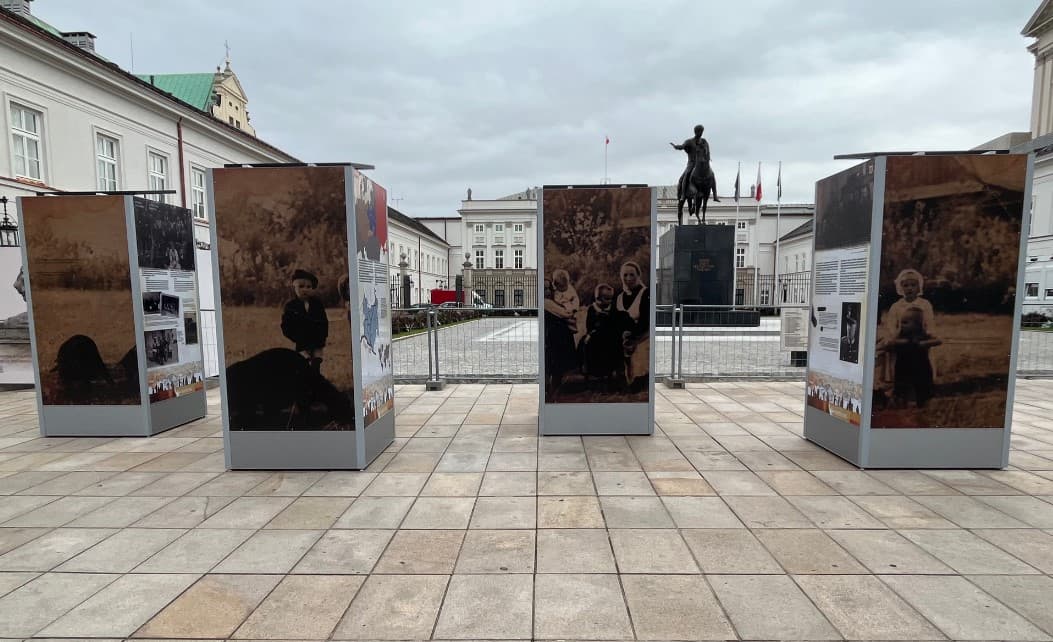KRAKÓW, Poland – Visiting Poland’s presidential palace in Warsaw right now, one can’t miss four staggered pillars on the sidewalk, with one side of each pillar depicting a piece of a mid-20th century photograph of the celebrated Ulma family, and the other side telling their story of heroism during World War II.
The exhibition at the palace was set up ahead of the Ulma family’s looming beatification on Sept. 10, as an effort by the Polish government to “strengthen the memory … and preserve the legacy of their heroism,” Jakub Beczek, an official within the Chancellery of the President of Poland, told journalists on Aug. 29.
It will be the first time an entire family has been beatified, including an unborn child.

The story of the Ulma family dates to the winter of 1942, when Józef and Wiktoria Ulma and their six children provided shelter for eight Jews in the attic of their home in Markowa, Poland. At the time, German military and police were operating on Polish territory, and, according to their decrees, any form of help or contact with Jews was punishable by death.
Markowa is a small village – mainly a farming community – in southeastern Poland, where there was a population of about 4,500 people, including about 120 Jews, before the war.
The Ulma family provided shelter to the eight Jews until they were denounced by a policeman early in 1944. On March 24, 1944, a handful of German officers arrived at their house.
First, the Germans murdered the Jews, then Józef and Wiktoria Ulma, who was late in pregnancy at the time. They then killed the six living children: Eight-year-old Stanisława, six-year-old Barbara, five-year-old Wladysław, four-year-old Franciszek, three-year-old Antoni, and year-and-a-half-old Maria.
For their heroism, in 2003 the Archdiocese of Przemyśl initiated a beatification process for the Ulma family. On December 17, 2022, Pope Francis approved a decree on the martyrdom of the Ulma family, thus clearing the path for their beatification.
Of the upcoming beatification, Minister Wojiech Kolarski, Secretary of State at the Chancellery for the President of the Republic of Poland, told Crux that it’s an honor for the country and of “extreme importance” to help keep the Ulma family’s legacy alive in future generations.
“It’s important not just to shed light, but also indicate the values that guide the Ulma family because they are eternal values now and for future Polish families,” Kolarski said.
Those values, Kolarski noted, include dedication, and a willingness to sacrifice for another human being.
The Ulma family’s story is renowned across Poland, and is highlighted by community leaders as well.
Speaking to a group of journalists in Poland on a trip sponsored by the Ministry of Foreign Affairs, Sebastian Rudol, deputy director and chief development officer of the Jewish Community Centre in Krakow, highlighted how the story is “very much present in [their] community.”
The Jewish Community Centre provides Krakow’s Jewish community with a number of services and events. It also works to revive Krakow’s Jewish community, which, along with the rest of the country, was decimated by World War II and the Communist regime that followed until 1989. The centre opened with about 100 members in 2008, and now has over 860.
Rudol said the story of the Ulma family has been spoken about since the Jewish Community Centre opened, and is a part of a complex story of what happened during the war – where while there were many Poles, like the Ulma family, who helped Jews, there were also many who didn’t help.
“We want to make sure that we acknowledge those attitudes that people have during the war, both the good and the bad, and we believe that the Ulma family is an example of what’s best of humanity,” Rudol explained. “This idea of the righteous person is a very important, key idea.”
Over the years, some critics have objected that the Polish government has attempted to extol the sacrifice of the Ulma family partly in an effort to whitewash Poland’s complicated history regarding anti-Semitism and the fate of Jews during the Second World War. A 2018 article by the Israeli newspaper Haaretz claimed some Jews were boycotting a museum named for the Ulmas for that reason.
The beatification is the latest in a long list of honors bestowed upon the Ulma family.
In 1995, Wiktoria and Józef Ulma were posthumously honored with the title of “Righteous among the Nations” by the Israeli Yad Vashem Institute. In 2010, then-President of the Republic of Poland Lech Kaczyński decorated them with the Commander’s Cross of the Order of Polonia Restituta.
In 2018, on the anniversary of the day they were killed in Markowa, President of the Republic of Poland Andrzej Duda established March 24 – the day the Ulma family and the Jews they hid were killed – as a National Day of Remembrance of Poles saving Jews under German occupation.
There is also the Museum of Poles Saving Jews in World War II that opened in Markowa in 2016.
The exhibition set up in front of Poland’s presidential palace, titled Death for Humanity, tells the story of the Ulma family and their heroism, and also highlights the overall “German Terror” of World War II, the Holocaust, and the Jewish survivors in Markowa, of which there were 21.
Next to the exhibition, there’s a board with a message from Duda, who also said he expects the exhibition to help commemorate and educate people on the Ulma family.
“I trust this exhibition, and in its wake other forms of commemorating Poles who saved Jews, will contribute to the widest possible dissemination of knowledge about the Ulma family and this tragic yet glorious episode of our history, of which they have become a symbol,” Duda said.
Follow John Lavenburg on Twitter: @johnlavenburg












